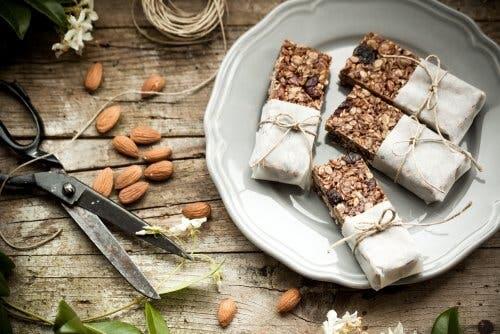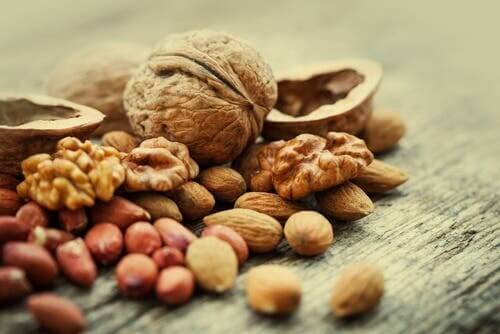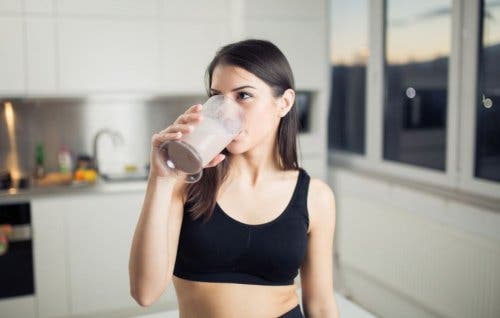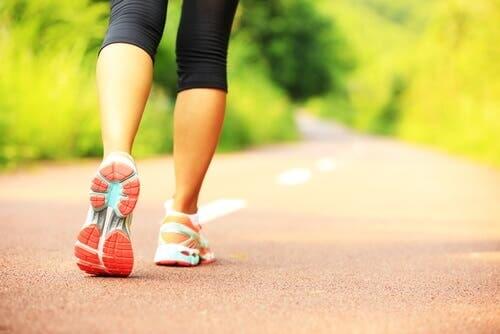What Should You Eat Before Running?

One of the most important questions athletes should ask themselves is what to eat before running. Without a doubt, it’s a logical question, since depending on your diet choices, your performance can be better or worse.
In practice, eating before, during, and after training is as important as the exercise itself and has a decisive impact on your performance.
Eat before running: The main recommendations
Certain foods can help you reach optimal performance in exercise. Keep reading to learn more about them.
1. Granola bars

The goal of your pre-workout meal is to provide your body with the fuel it needs for maximum energy and performance. However, it’s also important to make sure the food is light.
For this reason, granola bars are an excellent option, since they quickly provide the glucose that your body needs. They’re a fast, light meal that gives you the energy you need for your workout.
Read: How to Make Gluten-free Granola Bars
2. Natural protein
Another excellent option we recommend you eat before running is a natural protein, found in foods such as chicken or natural tuna. Of course, since it’s a pre-workout meal, you should eat small portions to avoid running on a full stomach.
In a nutritional analysis, this type of natural protein is very healthy and provides all the energy you need for maximum sports performance. Also, they help you feel full.
3. Whole grain bread
One or two slices of whole wheat bread, along with a slice of turkey, also calms your appetite and provides the energy you need for a good run.
In this case, turkey is a quality natural protein, while whole wheat bread contains slow absorbing carbohydrates, the perfect thing to eat before running.
4. Nuts

We also highly recommend eating nuts before training. These delicious snacks have numerous beneficial properties for your general health. Also, nuts are a quick, healthy, and filling snack that provides a lot of energy before training.
5. What to eat before running: A balanced breakfast
If you have a little more time, you can make a more complete breakfast a couple of hours before training. However, it’s important that you also eat the right foods.
In this case, a complete, balanced, and recommended breakfast may consist of hard-boiled eggs, fresh fruits rich in vitamin C, skim milk, and a small portion of nuts, for example.
Read: Four Breakfasts with Chia Seeds You’ll Love
6. Low-calorie cheese
Low-calorie cheese, especially white cheese, is also a good food to eat before going for a run. It’s enough to eat two or three slices, either alone or with whole wheat bread, for a more complete meal.
You can also combine a slice of low-calorie cheese with a slice of turkey. It’s a fast, healthy, and perfect food to eat before any type of training.
7. Smoothies

Smoothies, especially protein shakes, provide many benefits to your body before exercising. This excellent option is quick and healthy and you can opt for natural shakes or premade ones.
If you choose natural smoothies, you can make a smoothie with skim milk and a very ripe banana. You can mix healthy protein shakes with water or milk.
General recommendations for eating before running
These tips are very useful for any athlete or runner:
Eating time before running

It’s essential you eat at least one hour to 30 minutes before starting your training. If it’s a more complete and heavy meal, we recommend you eat two hours before.
It’s important to digest before you start running since your energy level depends on it!
What to eat before running
Gone are the myths that said that you should run or practice any other sport on an empty stomach. That myth was especially used by people looking to lose weight faster. In reality, you have to eat before training so that your body has enough fuel to turn into energy. What’s really important is the kind of food you eat.
Given the concern about what to eat before running, you should choose healthy, light foods that provide a lot of energy. Your performance will depend on it.
All cited sources were thoroughly reviewed by our team to ensure their quality, reliability, currency, and validity. The bibliography of this article was considered reliable and of academic or scientific accuracy.
- Giezenaar C., Lange K., Hausken T., Jones KL., et al., Acute effects of substitution, and addition, of carbohydrates and fat to protein on gastric emptying, blood glucose, gut hormones, appetite, and energy intake. Nutrients, 2018.
- DePhillipo NN., Aman ZS., Kennedy MI., Begley JP., et al., Efficacy of vitamin C supplementation on collagen synthesis and oxidative stress after musculoskeletal injuries: a systematic review. Orthop J Sports Med, 2018.
- McGlory C., Devries MC., Phillips SM., Skeletal muscle and resistance exercise training; the role of protein synthesis in recovery and remodeling. J Appl Physiol, 2017. 122 (3): 541-548.
This text is provided for informational purposes only and does not replace consultation with a professional. If in doubt, consult your specialist.








